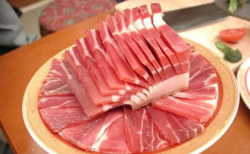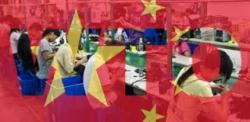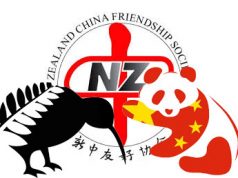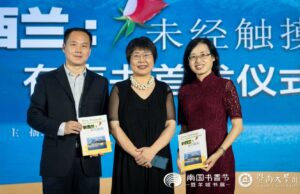NEXT BRANCH MEETING
 Mr. Dave Feickert will speak on “From ‘faster is better’ to ‘better is faster’ in China and New Zealand”
Mr. Dave Feickert will speak on “From ‘faster is better’ to ‘better is faster’ in China and New Zealand”
Dave Feickert is a coal mine safety adviser and also President of the Whanganui Branch of the NZ China Friendship Society. Since 2005 he has been advising the Chinese Government and coal companies and has submitted evidence to the Pike River Royal Commission.
Dave won China’s Friendship Prize for Foreign Experts in 2009, along with another Kiwi, Lewis Dagger. Only 11 New Zealanders have won this prize, one of these being Dave’s farmer brother, Peter, who was awarded the prize in 1998. Dave received the prize for his work, helping to improve coal mine safety and health in China’s accident prone mines. He and other foreign advisers have helped to cut the accident rate by 70% in the last five years, but there is still some way to go.
Wednesday, 16 November 2011, at 5:45 pm, Connolly Hall, Guildford Terrace, off Hill Street, Thorndon, Wellington. (Car park up Guildford Tce beside Hall)

An optional Chinese buffet meal, supplied by the Fujiyama Café, will follow the meeting at 7 pm. Orders for the $11.00 meal (please pay at the door) will be taken up till 6 pm. If you think you may be arriving late, please let the Secretary know in advance.
ALSO COMING UP THIS MONTH
5, 12, 19 November 3:15pm Mandarin Corner, 20 Kelburn Parade
23 November 7:00pm Film Evening, 101 Wakefield St
26 November 3:15pm Mandarin Corner, 20 Kelburn Parade
See below for further details.
NEW MEMBERS – A warm welcome to Lilly Shi and Tamsin Fisher.
SEASON’S GREETINGS
As this is the final Letter for 2011, the Executive Committee and Editorial Group wish you all a Merry Christmas and Happy New Year. Have a safe and pleasant holiday season until the New Year Dinner in January 2012.
REPORT ON LAST MEETING (from Joy Bickley Asher)
China vs. All Blacks World Cup Final 2031.
China will shake the world in a unique way over the next twenty years and even a Rugby World Cup final between the China rugby team and the All Blacks is a possibility. That was the take home message from Mr. Chris Elder, New Zealand Ambassador to China in the 1990s and speaker at the October meeting of the Wellington Branch of the China Friendship Society.
Drawing on his almost 40 year long association with China and ‘with the benefit of foresight’ Mr. Elder talked about what 2031 might look like.
First, China will be globally dominant – economically, politically and militarily. Next, there will be greater trading interdependence between China and neighbouring states including Taiwan. Furthermore, China will have increased international influence in such organisations as the UN with a focus on social and economic rights.
We are likely to see further emergence of authoritarian capitalism and illiberal market economies rather than the development of democracy. New Zealand’s place in all this will involve difficult choices. In order to protect her interests, New Zealand may still have to adapt to dealing with countries whose values are very different from those held by most New Zealanders. Finally, New Zealand leaders will need to weigh up very carefully the degree to which they will need to cooperate with China. At the same time it will continue to be important to absorb any lessons from their contact with China. Mr. Elder entertained the audience with his witty and erudite presentation.
2012 NEW YEAR BANQUET PRELIMINARY NOTIFICATION
The 2012 New Year Banquet will be quite early next year, before the next Newsletter. Currently we are expecting the banquet to be at Dragons Restaurant, 25 Tory St, on Sunday 29 January at 6:30pm. Please be on the lookout for an email or posted Banquet Registration Form in early January.
CHINESE HAMS (from George Mills)
 Chinese ham, known as huotui (red ham) in Chinese for its colour, has a long history. The best-known ham is produced in Jinhua, Zhejiang province. Wang Mengyin, a famous traditional Chinese physician from the Qing Dynasty (1644-1911), was quoted as saying that “hams from Jinhua, particularly in Dongyang, are not only delicious, but also good for our health. It is best to be cured with salt in the winter and preserved for more than two years.” Jinhua ham, salted with carefully selected rear legs from Jinhua hogs, is famous for its shape, and unique flavour and taste. With the complicated process of salting, shaping, washing and drying, Jinhua ham is the quintessence of Chinese cured meat. In the Qing Dynasty, it was paid as tribute to the emperor. As it is easy to preserve and transport, it sells well around the world. Jinhua ham originated in the Northern Song Dynasty (960-1127) when Zong Ze, a famous general, carried hams from his hometown of Zhejiang to Kaifeng, Henan province, to build morale among his soldiers. Jinhua ham comes in various styles, named after curing seasons and methods, such as hams cured in the winter, hams cured in sugar, smoked hams and crescent-shaped hams. Another well regarded ham is produced in Xuanwei County in north-eastern Yunnan province, and dates back 250 years. With its fragrant flavour and delicate taste, it has enjoyed robust sales both in China and abroad. Xuanwei has both very good hogs (called Wemeng), and weather for curing hams. The salt coming from western Yunnan also contributes to the well regarded taste of Xuanwei Ham. Shaped like lutes, it is also known as “lute pettitoes.” Xuanwei Ham can be stir-fried, deep-fried, steamed and stewed. Moon cakes stuffed with Xuanwei Ham is a traditional snack for Yunnan’s people during the Mid-Autumn Festival. It is salty, sweet, but not greasy. (from chinaculture.org, edited)
Chinese ham, known as huotui (red ham) in Chinese for its colour, has a long history. The best-known ham is produced in Jinhua, Zhejiang province. Wang Mengyin, a famous traditional Chinese physician from the Qing Dynasty (1644-1911), was quoted as saying that “hams from Jinhua, particularly in Dongyang, are not only delicious, but also good for our health. It is best to be cured with salt in the winter and preserved for more than two years.” Jinhua ham, salted with carefully selected rear legs from Jinhua hogs, is famous for its shape, and unique flavour and taste. With the complicated process of salting, shaping, washing and drying, Jinhua ham is the quintessence of Chinese cured meat. In the Qing Dynasty, it was paid as tribute to the emperor. As it is easy to preserve and transport, it sells well around the world. Jinhua ham originated in the Northern Song Dynasty (960-1127) when Zong Ze, a famous general, carried hams from his hometown of Zhejiang to Kaifeng, Henan province, to build morale among his soldiers. Jinhua ham comes in various styles, named after curing seasons and methods, such as hams cured in the winter, hams cured in sugar, smoked hams and crescent-shaped hams. Another well regarded ham is produced in Xuanwei County in north-eastern Yunnan province, and dates back 250 years. With its fragrant flavour and delicate taste, it has enjoyed robust sales both in China and abroad. Xuanwei has both very good hogs (called Wemeng), and weather for curing hams. The salt coming from western Yunnan also contributes to the well regarded taste of Xuanwei Ham. Shaped like lutes, it is also known as “lute pettitoes.” Xuanwei Ham can be stir-fried, deep-fried, steamed and stewed. Moon cakes stuffed with Xuanwei Ham is a traditional snack for Yunnan’s people during the Mid-Autumn Festival. It is salty, sweet, but not greasy. (from chinaculture.org, edited)
IDIOM OF THE MONTH (from George Mills)
水能載舟,亦能覆舟 (shuǐ néng zài zhōu, yì néng fù zhōu)
Not only can water float a boat, it can sink it also (Equivalent English saying: The knife cuts both ways)
THE 7TH ANNUAL WELLINGTON CHINESE FILM FESTIVAL
The 7th Chinese Film Festival in Wellington will be held from 17th Nov to 20th Nov in the Penthouse Cinema, during which more than 10 newly-made popular Chinese films will be screened. Tickets are sold at the cinema. See www.eventfinder.co.nz/2011/2011-chinese-film-festival/wellington for further details.
THE NEW ZEALAND “LITTLE SWALLOW” (from Luke Qin 秦瞳)

I was really delighted to see Nathalie Harrington at the “Discover China” program held jointly by the Confucius Institute and Volunteer Wellington on 20 September although she couldn’t recall that we had met at the “Chinese Bridge Competition” at VUW earlier this year when I took a photo of her and her winner’s trophy. I couldn’t help but feel like a paparazzo as she had proved to be a huge hit on Chinese national TV when she won the first prize representing NZ at the 10th “Chinese Bridge” (Chinese language Proficiency) Competition for Foreign College Students Grand Final. Didn’t she do NZ proud!
She chuckled and shrugged it off with typical Chinese modesty when I said to her in Mandarin, as if she were a fellow Chinese native, that I had seen her on TV and that I would have signed her without batting an eyelid if I was a film director. Her depiction of the famous “Little Swallow”, a saucy and mischievous Qing Dynasty princess of a classic TV series, was so well done that it really begged belief that she wasn’t a movie star and Chinese was her second language. If you think this is impressive think again, as she has also learnt varying amounts of Spanish, Te Reo Maori and Italian, and is a law student at VUW.
So what about some unedited response from Nathalie when I asked her in an email what she wanted to do in life? “Diplomacy is something that has always intrigued me and I suppose that foreign affairs is an area that I have been interested in since high school. I know that whatever I end up doing will, in some way, involve China. I hope that it more specifically involves the relationship between NZ and China. That relationship is obviously going to have a huge influence on NZ in the future so the idea of being involved in forging that relationship is very exciting!”
“In the short term, my aim is to improve my Chinese: although my speaking is okay, I have a long way to go when it comes to writing. I hope to reach a level of being able to write academically, which I’m sure will help me hugely in whatever career I have. To do this, I will have to do some language courses in China, which I am currently trying to sort out.”
You can probably tell by now that she is well-versed in the eternal Chinese virtue of being humble and modest while knowing exactly what she wants to achieve in life. Remember this name Nathalie Harrington (何晓玉). She is doing us proud.
MANDARIN CORNER 汉语角 3.15pm – 4.30pm Saturdays during school terms
Mandarin Corner currently meets Saturdays (excluding school holidays), 3.15-4.30 pm at the Seminar Room, 20 Kelburn Parade, Victoria University of Wellington. There is a topic for each session to stimulate interest.
All welcome. Gold coin donation.
Four sessions in November: 5 November – Zisha Teapots 紫砂壶 12 November – Suzhou Gardens 苏州园林 19 November – Chopsticks 筷子 26 November – Chinese Silk 中国织绸
Contact: Ellen Yang, 473-7558, 027-4756888, [email protected].
CHINESE FILM 中国电影
Date: Wednesday 23 November Time: 7.00pm – 9:30pm
Venue: Committee Room One, Wellington City Council, 101 Wakefield Street. Gold coin donation appreciated.
7-7:30pm Documentary—The Story of Jinyuchi Community, Beijing 金鱼池社区的故事
7:30 Feature Film—Life 人生 (105 minutes with English subtitles)
Director: Wu Tianming; Starring: Zhou Lijing, Wu Yufang
Adapted from the novel with the same title, this is a tragedy that occurs in “modern” China. Through a vivid description of the frustrated life story of Gao Jialin, a high school graduate who is first dismissed from his teaching post and then enrolled as a journalist in the city and finally dismissed from the post to become a farmer again, this movie presents the young man a serious issue of how to deal with his life.
CHINESE PUBLIC’S PERCEPTIONS OF THE WTO 10 YEARS ON (from George Mills)

Ten years on from China’s accession to the World Trade Organization (WTO), many Chinese have changed their views of the organization over the years. In the 1980s, many Chinese viewed the WTO and its precursor as “clubs of the rich,” in which wealthy, developed countries imposed rules on poor, developing nations. Negotiations over the terms of China’s WTO accession took more than 15 years, but the drawn-out negotiations served as a driver of market-oriented reforms and helped educate the public and the government about the multilateral trading system. To ease the overall doubts about the long-term benefits of the multilateral trading system, the Chinese government and academia made many efforts to educate the public, including publishing thousand of books about WTO rules. Rapid economic growth has been the most convincing factor in reshaping popular opinions of the WTO, however. Since China joined the WTO in 2001, the country’s GDP has increased at an average rate of more than 10% per year, and China has become one of the largest trading nations. In 2000, the last full year before China joined the WTO, China was the world’s 7th-largest exporting country and the 8th-largest importing country. In 2010, China became the world’s largest exporter and 2nd-largest importer of goods. Investment activity also showed a similar surge after accession, with China becoming one of the hottest destinations for foreign direct investment (FDI). In the post-accession decade, China attracted US$653.1 billion in FDI, with an average increase of 9.5 percent a year. In 2010, FDI coming to China reached $105.7 billion, nearly 1.3 times the 2000 level. At the same time, China began to emerge as a major world investor. In 2010, Chinese outbound investment reached $67.8 billion, with accumulated outbound investment totalling more than $300 billion dollars. Analysts consider China’s WTO accession and corresponding integration into the global economy as two of the most important factors that contribute to China’s rapid economic growth. Surveys have shown that the notion of the WTO as a “public good” has become more widespread in China since the country’s 2001 WTO accession. The public now considers the WTO as one of the most widely recognized international organizations in China, along with the United Nations and the World Health Organization. (from Wang Yong, The China Business Review, edited.)
MANY MORE CHINESE BABIES AND MOTHERS SURVIVING CHILDBIRTH (from Joy Bickley Asher)
 Moving births into hospitals has saved the lives of thousands of Chinese babies between 1996 and 2008. Only half of all births in China took place in hospitals in 1996 and by 2008 this figure had increased to almost all of them. This move, according to an article published in The Lancet medical journal, accounts for the substantial drop in the numbers of deaths of newborn babies from 24.7 per thousand in 1996 to 9.3 per thousand in 2008.
Moving births into hospitals has saved the lives of thousands of Chinese babies between 1996 and 2008. Only half of all births in China took place in hospitals in 1996 and by 2008 this figure had increased to almost all of them. This move, according to an article published in The Lancet medical journal, accounts for the substantial drop in the numbers of deaths of newborn babies from 24.7 per thousand in 1996 to 9.3 per thousand in 2008.
According to UN figures China has achieved its 2015 goal of reducing the under-five mortality rate by two thirds between 1990 and 2015. China is also on target to reduce the maternal mortality ratio by three quarters. Now, babies born in an urban hospital have a 5 per 1000 mortality rate, almost as low as that in the UK which is 3 to 4 per thousand.
The article’s authors, Xing Linfeng and Yan Guo of Beijing University and Professor Carine Ronsman from the London School of Hygiene and Tropical Medicine, said that the decline is spectacular and the Chinese government should be congratulated. The improvements have been brought about by strengthening facilities, training providers, equipping them with the skills and drugs to offer better care and, through insurance, encouraging families to give birth in hospitals.
There is still some disparity between poor rural areas and urban areas. Babies in poor rural areas are four times more likely to die than those in the wealthier urban areas. This disparity is likely to be reduced by the recent Chinese government initiative to introduce subsidies to help poor rural women.
From ‘China cuts childbirth mortality’ by Tania Branigan, The Guardian Weekly, 23 September 2011.









